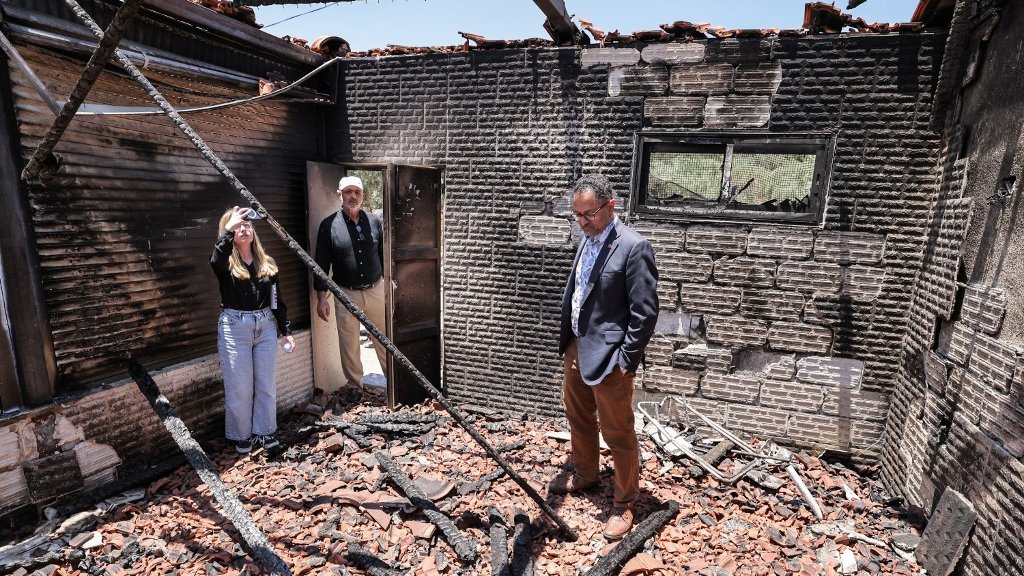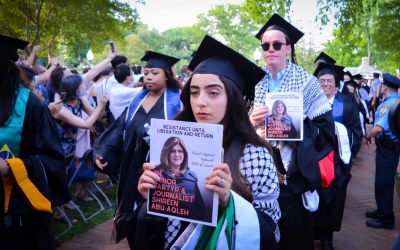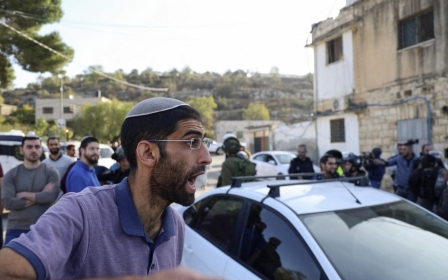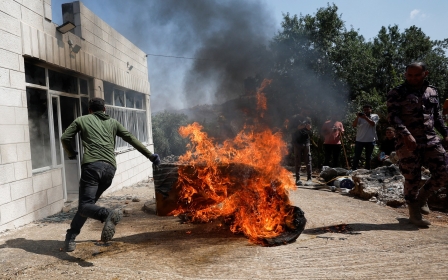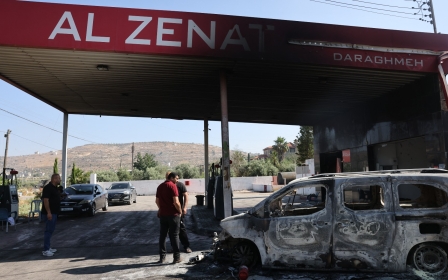'In Chicago we could have been neighbours': Palestinian Americans attacked by settlers
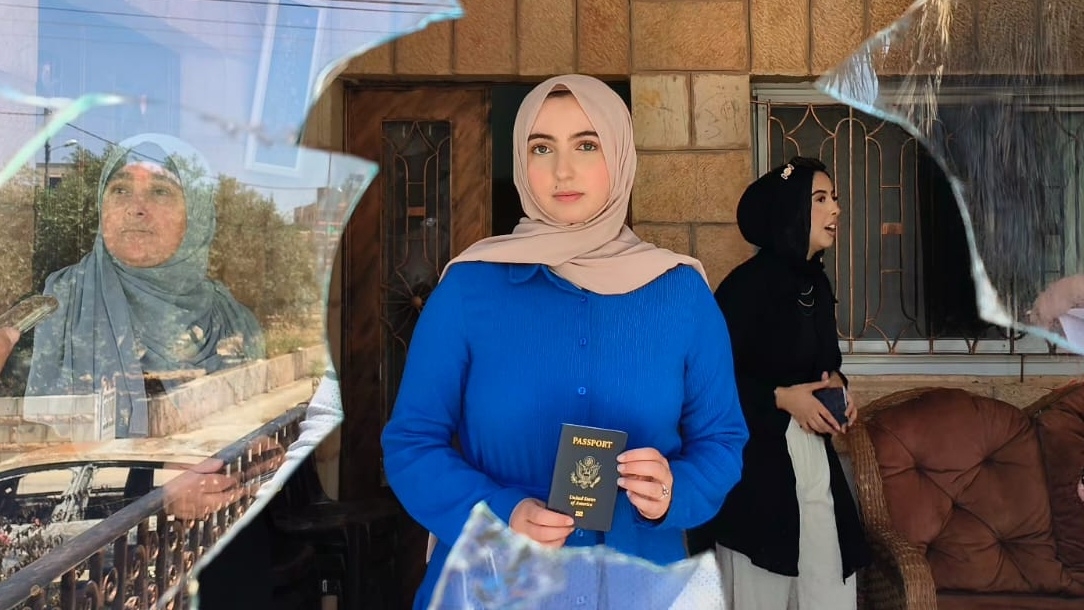
The Abdul Aziz family, like many people in the Palestinian village of Turmusaya, are Palestinian Americans.
Though they have a long-established, happy and successful life in Chicago, they have never cut their roots in Palestine, and this summer Olfat Abdul Aziz decided it was time to take her children back to the village where she was brought up.
It was supposed to be the holiday of a lifetime.
It turned into a nightmare.
Olfat’s 20-year-old daughter Amal, a pharmacy student back in Chicago, told Middle East Eye how she was doing her homework on Wednesday afternoon when she heard loud noises in the street outside the house.
New MEE newsletter: Jerusalem Dispatch
Sign up to get the latest insights and analysis on Israel-Palestine, alongside Turkey Unpacked and other MEE newsletters
She and her older sister Noor went out onto the porch of their large detached home to see what was happening. It was a near-fatal mistake. Nothing in her American life had prepared her for what came next.
She saw a mob of approximately 50 Israeli settlers moving from house to house, many with guns in their hands and wearing black face masks, attacking everybody they saw, brutally setting on a Palestinian man tending his garden.
And then they saw her.
The mob zeroed in on her family.
'Last day on earth'
In a panic, they ran to the basement for protection. “We truly thought that this was our last day on earth,” said Amal.
“I thought I wouldn’t reach my 20th birthday,” which was the following day.
Meanwhile, her newly married sister Noor was texting her husband. The text read as follows: “If this is the last time I see you I love you and I hope to see you in the afterlife.”
More practically, they called the US consulate in Jerusalem in a desperate plea for help. No reply.
While they were still hiding in the basement, the settlers were setting fire to their house above them.
“If it hadn’t been for some brave men in the village who came in and took out a burning couch the whole house would have burnt down,” said Noor.
The damage was everywhere to see: smashed windows and scorch marks on the grill separating the porch from the main house. The family’s Skoda, parked just outside, was burnt to a cinder.
Olfat Abdul Aziz, who works as a teacher in Chicago, told MEE: “It was an intentional attack. The scariest part is that the people who attacked us are originally American citizens. They are proud of being American Israelis.”
Back in the United States, she said, they could have been neighbours.
MEE is unable to verify the identities of the settlers responsible for the attack on the Abdul Aziz family’s home. But immigrants from the United States do make up a significant proportion of the settler population.
'The scariest part is that the people who attacked us are originally American citizens. They are proud of being American Israelis'
- Olfat Abdul Aziz
Last year, Haaretz quoted Central Bureau of Statistics data showing that about 40 percent of all immigrants moving to West Bank settlements in 2021 were from the US. According to an estimate from 2016, American citizens account for about 15 percent of the total settler population of 450,000.
The population of Turmusaya, located along the main road connecting the West Bank cities of Ramallah and Nablus, is about 4,000. But there are about 14,000 Palestinians originally from the village living abroad, most of them in the United States.
Wednesday’s attack followed overnight attacks by settlers in several West Bank towns after four Israeli settlers were killed in a shooting at a petrol station near the settlement of Eli, a few kilometres north of Turmusaya.
Turmusaya’s mayor, Lafi Adeeb, told MEE that about 400 armed settlers had attacked the village.
While the Abdul Aziz family were fortunate to escape harm, others in the village are now in mourning.
Local farmer Raja Jibra described how his nephew Omar Hisham Jibra rushed into his restaurant to warn him as the settlers from the neighbouring settlement of Shilo started to rampage through the village.
First Raja and Omar hooted their car horns to sound the alert, then stepped out of their vehicles to confront the rampaging mob. Raja recalls that Omar was in front of him and was shot twice in the chest.
Another villager told us that 27-year-old Omar, who was married with two young children, had been killed while trying to rescue others.
Raja carried his dying nephew 500 metres to a waiting ambulance, which was unable to get closer due to the chaos.
He then returned to the fray, carrying another man to the ambulance. In all, 12 people are reported injured, while some 30 homes were burnt and approximately 60 cars destroyed.
Message for Biden
Unlike many people in the village, Omar Jibra is not an American citizen, though relatives told MEE that his wife and children do hold American passports.
MEE spoke to his brother Abdullah, who had flown back overnight from his home in Texas to join his brother’s family in their grief.
'We Palestinian Americans pay taxes to the American government as loyal citizens. Mr Biden helps fund Israel with our money and our taxes'
- Abdullah Jibra, US Palestinian
As he held his nephew in his arms, Omar’s three-year-old son, also called Abdullah, MEE asked him if he had a message for US President Joe Biden.
“We Palestinian Americans pay taxes to the American government as loyal citizens. Mr Biden helps fund Israel with our money and our taxes. We are asking for help for all American citizens in Palestine and for our basic human rights,” Abdullah replied.
As for the Israeli government, he asked that they “just leave us in peace”.
At a press briefing in Washington on Wednesday, a State Department spokesperson was asked what “tangible measures” the US government was taking to prevent further attacks on Turmusaya, given the presence of US citizens and extensive US-owned property in the village.
Vedant Patel told journalists: “We continue to engage on this issue directly. We take steps through dialogue, through our engagement in the region, through raising this directly with Israeli officials as well as officials on the Palestinian Authority.”
The presence of so many US citizens in Turmusaya was also noted by diplomats during a visit to the village on Friday.
"The fact that something like this major attack could happen in this quiet township where many of the inhabitants are American citizens and certainly have absolutely no connection with terrorism, how could this have happened?" said Diane Corner, the British Consul General in Jerusalem.
Oday Jibra, a cousin of Omar, had just returned to Turmusaya to attend the marriage of his brother-in-law.
The marriage, booked for the day of the attack, turned into terror. Oday described how his wife Badria, his four-year-old daughter Hiam and other family members were trapped in a burning house because the settlers had blocked the drive with burning cars.
Oday said he had been forced to climb over a three-metre wall to reach them in a house that was already full of smoke, as settlers threw stones at him
“I do not know how I did it, I lost all fear in the crisis,” he said.
Oday added that his daughter asked him: "Please take me back to California." She is now too frightened to sleep in her own room.
When MEE asked him for his message to the US government he replied: “Stop listening to the lobby groups. Pay attention to basic human rights.”
Middle East Eye delivers independent and unrivalled coverage and analysis of the Middle East, North Africa and beyond. To learn more about republishing this content and the associated fees, please fill out this form. More about MEE can be found here.


